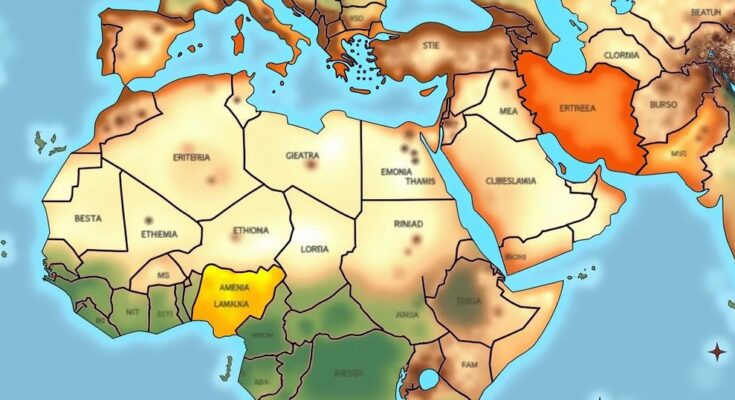Eritrea’s President Isaias Afwerki has hosted a trilateral summit with the leaders of Somalia and Egypt to address regional tensions with Ethiopia. The discussions focused on strengthening military cooperation and confronting foreign interference while addressing Somalia’s security challenges. Tensions have escalated following Ethiopia’s agreement with Somaliland, leading Egypt to strengthen ties with Somalia. Despite aggressive rhetoric, analysts suggest that military conflict remains unlikely in the immediate future due to various internal challenges faced by these nations.
On October 10, Eritrea’s President Isaias Afwerki convened a trilateral summit in Asmara with Somalia’s President Hassan Sheikh Mohamud and Egypt’s President Abdel Fattah el-Sisi. The primary focus of this rare meeting was to discuss strategies to counter perceived foreign interference in the internal affairs of the East African nations, as stated in a joint announcement following the summit. Furthermore, the leaders committed to enhancing collaboration to fortify Somali governmental institutions, thereby enabling Somalia to effectively combat terrorism, safeguard its territorial integrity, and protect its borders. This summit arises in the context of increasing tensions among these countries and Ethiopia. The relationship between Ethiopia and Somalia has notably deteriorated since January, when Ethiopia and Somaliland agreed on a memorandum of understanding (MoU), which Somalia argues undermines its sovereignty over Somaliland. Ethiopia’s potential recognition of Somaliland’s independence, contingent upon leasing coastal land for a naval base, has particularly aggravated Somalia. In response, Egypt has leveraged the situation to apply pressure on Ethiopia, exacerbating existing disputes centered on the Grand Ethiopian Renaissance Dam (GERD), which Egypt views as a direct threat to its water resources. Egypt has bolstered its military partnership with Somalia, providing weaponry and suggesting the replacement of Ethiopian troops stationed in Somalia with its own forces in a bid to combat Al-Shabaab effectively. Somalia has even signaled the intention to expel all Ethiopian military personnel by year’s end unless the MoU with Somaliland is rescinded. Eritrea, having fought alongside the Ethiopian government during the Tigray conflict, now finds itself at odds with Addis Ababa, particularly over concerns about the peace agreement reached with the Tigray People’s Liberation Front (TPLF) in November 2022 and fears regarding Ethiopian ambitions aimed at regaining access to Eritrean ports. Abel Abate Demissie from Chatham House articulates that President Afwerki perceives an imminent direct conflict as a possibility, thus seeking alliances with Ethiopia’s regional adversaries. While the rhetoric surrounding potential military confrontations is intense, analysts suggest that a direct military engagement remains unlikely in the immediate future, as both Somalia’s military capacity is limited and Egypt is preoccupied with domestic economic challenges and international conflicts. Eritrea is still recuperating from its prior war with the TPLF, while Ethiopia faces domestic insurgencies. According to Omar Mahmood of the International Crisis Group, these maneuvers appear more symbolic than substantial. Nevertheless, the implications for Ethiopia and Eritrea are concerning, signaling a reversal of the rapprochement previously established in 2018. The dynamics have reverted to a state of ‘no war, no peace’, according to Mahmood, underscoring a fragile regional stability.
The regional dynamics in East Africa have become increasingly complex following historical tensions, especially between Ethiopia, Somalia, and Eritrea. Eritrea’s long-standing grievances regarding its landlocked status and Ethiopian military ambitions have fueled its current diplomatic efforts to align with regional adversaries to counterbalance Ethiopia’s influence. Understanding these relationships is crucial for grasping the potential implications for security and stability in the region. The context of the trilateral summit reflects longstanding grievances over sovereignty issues, particularly concerning Somaliland, and exacerbated tensions related to water resources with the GERD project. The interplay of military and diplomatic maneuvers reflects the intricate and often fraught relationships that characterize the Horn of Africa.
In conclusion, Eritrea’s recent trilateral summit with Somalia and Egypt highlights a concerted effort to confront Ethiopian influence and regional instability. While military confrontation appears improbable in the near term, the political landscape remains volatile, potentially jeopardizing any progress toward peace and cooperation in the region. The historical context of these relationships, along with current grievances, must be monitored closely to understand future developments in East African geopolitics.
Original Source: www.theafricareport.com




